| North Luangwa, 2007-2013 |
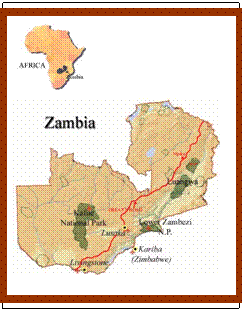 |
| Zambia |
In 1986 Dr. Delia and Mark
Owens entered the North Luangwa National Park (NLNP) of
Hammer now directs development programs through his non-governmental organization, The Foundation for Wildlife and Habitat Conservation - Zambia. As a result of these on going efforts since 1986, more than 37,000 people have improved quality of life with income increased 100% over poaching days.
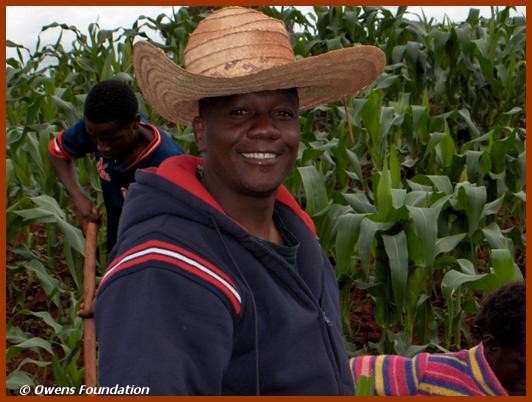 |
| Hammer Simwinga |
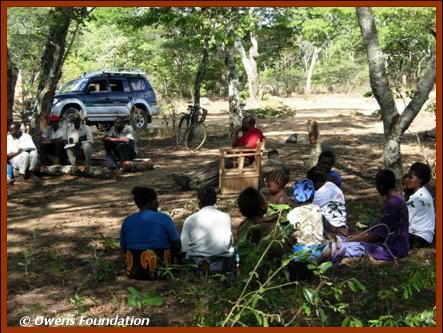 |
| Hammer meets with villages and their Chief to discuss new programs and saving wildlife. |
SMALL BUSINESS: FWHC's revolving loan program provides business and technical training for small business installation so that local people can earn legal income while providing goods and services to the village without poaching. Beekeeping provides income for the beekeeper, honey and bees wax for the village, plus support crop pollination. As the elephant population increases there will be more conflicts with people. When disturbed by nearby elephant infra-sound, bees chase the elephants away stinging their sensitive ears. Planting chili peppers adjacent to crops or creating string fences coated in ground chilies in an oil base also deter hungry elephants. Dried chilies also provide a cash crop for the farmer. Additional funds are being raised to install additional sunflower seed oil presses, beekeepers and new fish farms, etc. Above:
A video featuring the 6 winners entitled, Global Focus III, The New Environmentalists, will be shown on PBS and the Sundance Channel during the coming year.
RURAL HEALTH: Since 1994, OFWC has funded the training of more than 70 Traditional Birth Attendants (TBAs) in AIDS prevention, family planning, pregnancy monitoring and delivery, hygiene, first aid, childhood development and nutrition.
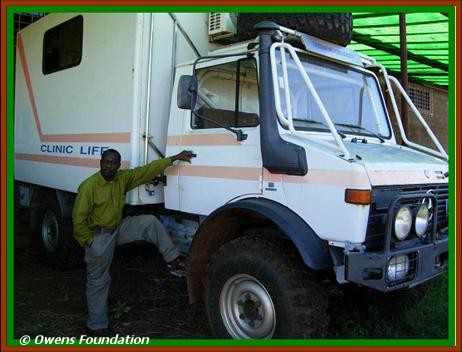 |
| Mobile Clinic |
Mobile Clinic: In 2008, the OFWC funded the purchase of a heavy duty Mercedes Benz Unimog truck outfitted as a Mobile Clinic for use by Hammer's FWHC. The Clinic is equipped for surgery, laboratory, x-ray, oxygen, refrigeration and dental treatment. This very heavy duty truck will facilitate access to extremely remote villages to bring AIDS testing (formerly not available), immunization programs plus treatment for a variety of medical needs. A surgeon from the Ministry of Health plus a Registered Nurse will staff the clinic plus a rotating corps of medical and public health volunteers from the USA who will collect data on the myriad of medical challenges faced by rural Zambians.
AGRICULTURE:
Hammer is a tropical agriculture specialist helping villages convert from slash and burn farming to sustainable, environmentally sound methods that include crop diversification that provides improved nutrition and year round food availability. Food assurance has more than doubled in project villages. Well fed people do not have to poach wildlife to survive.
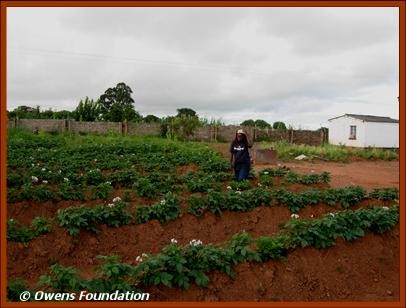 |
| A village woman with her healthy crops. She is providing a home for her grandchildren as both of their parents died.
A good harvest saves lives. |
REFORESTATION:
FWHC supports tree farming and reforestation programs and in 2007-2008 distributed more than 15,000 plants to the communities surrounding the North Luangwa National Park (NLNP - located in the Luangwa Valley at the base of the Muchinga Escarpment). Forests are being destroyed at an alarming rate for firewood and building materials. To restore forests and environmental health, Hammer promotes nitrogen fixing trees that provide farmers and the community with fodder, live fencing, mulching, soil erosion control, compost production as well as for firewood and shelter. FWHC promotes the use of the following tree types which have become indigenous over time:
![]() Sesbania sesban for soil fertility
Sesbania sesban for soil fertility
![]() Moringa for nutrition purposes in the area of HIV/AIDS supplements
Moringa for nutrition purposes in the area of HIV/AIDS supplements
![]() Collandria as soil fertility and bee fodder
Collandria as soil fertility and bee fodder
![]() Pigeon peas as soil fertility and food
Pigeon peas as soil fertility and food
![]() Fruit trees such as pawpaw, guavas, bananas, avocados and orange
Fruit trees such as pawpaw, guavas, bananas, avocados and orange
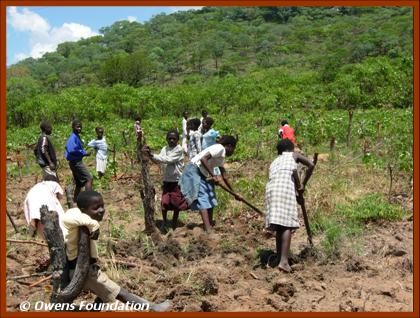 |
| School students plant tree saplings near their village. These children will be stewards of this restored woodland and understand its importance to their lives and to the wildlife. |
Hammer is working with a number of Chiefdoms located near the Lavushi Manda National Park (LMNP - located up on the plains west of the Muchinga Escarpment) to set aside tribal lands for forest protection and replenishment. Hammer is focusing on the Chiefdom's of Mpumba, Chiundaponde, Luchembe and Kopa - areas where wildlife has been almost poached out. With habitat restored and with protection from the Chiefs and their people, wildlife will return through historic migratory corridors from the now verdant NLNP where animals are being seen in areas where they have been absent for 50 years. Over 10,000 hectares of tribal forest land have been proposed as a nature reserve in Mpumba Chiefdom and another 5,000 hectares of forest in Chiundaponde. Hammer hopes to secure another 12,000 hectares in Chief Luchembe and Kopa.
Heading up the North Luangwa Wildlife Conservation and Community Development Programme (NLWCCDP), Simwinga protects the biodiversity of the North Luangwa National Park while simultaneously improving village life in the region through micro-lending, education, rural health programs and women's empowerment.
CONSERVATION EDUCATION:
Hammer provides materials and programs for local schools and in some cases helps to build new brick schools for remote villages. Hammer is currently building a Junior Ranger Center for area students to visit during their off weeks from regular school.
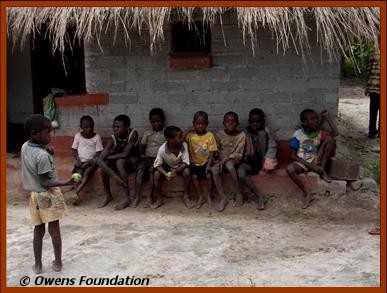 |
| These boys will not be poachers. |
TOURISM: OFWC promotes tourism in NLNP and in the future - hopefully in LMNP in coming years - providing income for the safari operator, local people and the Zambian government. More information and tourism links.
HAMMER SIMWINGA: winner of the 2007 Goldman Environmental Prize for Africa, TIME MAGAZINE'S International Edition - Environmental Hero in 2007 and the 2008 National Geographic Emerging Explorer. His Foundation has received funding from the OFWC, The Prince Bernhard Fund for Nature of The Netherlands, UK based Whitley Fund for Nature, Nikon Precision USA, South African Wildlife Heritage Organization, National Geographic Society, Save our African Wildlife Resource of Holland, among others. Additional funding is greatly needed and appreciated.
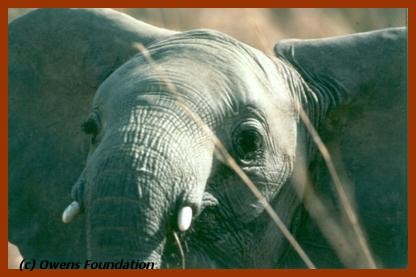 |
| Baby Elephant |

| Your donations qualify for US Federal tax deductions. |